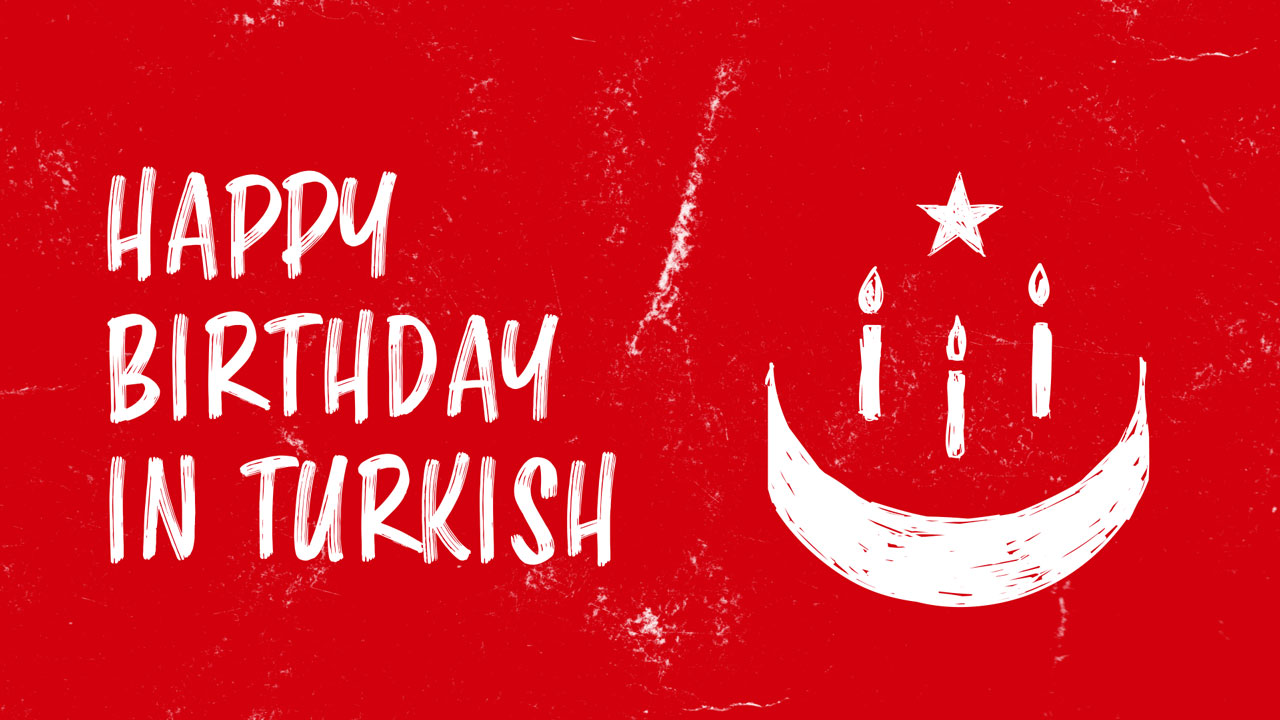7 Ways to Say Happy Birthday in Turkish
Want to surprise your Turkish friend or significant other on their birthday? Learning how to say “happy birthday” in Turkish would be a good way of doing so! You have several ways of saying it in Turkish.
Table of contents
Let’s start with a quick recap — here are 7 phrases that mean happy birthday in Turkish:
| Happy Birthday in Turkish | Audio |
|---|---|
| Doğum günün kutlu olsun | |
| İyi ki doğdun | |
| Mutlu yıllar | |
| Hayırlı yaşlar | |
| Mutlu yaşlar | |
| Nice senelere | |
| Nice yıllara |
How to Say Happy Birthday in Turkish
Let’s start with a note: in Turkish, both sene and yıl mean “year.” You can use them interchangeably, and will see both of them in the common birthday phrases below:
Doğum Günün Kutlu Olsun
One of the most common phrases, doğum günün kutlu olsun directly translates to “may your birthday be blessed.”
Doğum günün kutlu olsun is the full phrase for “Happy Birthday,” but sometimes people shorten it to just “Kutlu olsun.” While it’s not specific to birthdays, you may often hear people say it while wishing someone a happy birthday.
To make it even shorter, some social media users write DGKO, an acronym for Doğum günün kutlu olsun. Think of it as the Turkish equivalent of HBD.
İyi Ki Doğdun
A more friendly phrase, iyi ki doğdun literally means “it’s good that you were born.” If doğum günün kutlu olsun feels too long to remember, feel free to use this phrase — it checks out a lot of boxes: it’s short, relatively easy to remember, and has a deep meaning!
It’s worth noting that iyi ki doğdun is less formal than doğum günün kutlu olsun.
İyi ki doğdun is often followed by iyi ki varsin, meaning “I’m glad you exist.”
Mutlu Yıllar
Mutlu yıllar means “happy years” — you can use it to wish someone a happy birthday or a happy new year.
Hayırlı Yaşlar
Yaşlar means “ages,” so when you say hayırlı yaşlar to someone, you’re wishing them a “blessed new age.”
Mutlu Yaşlar
Similar to mutlu yıllar this phrase means “happy ages.” Unlike mutlu yıllar though, you wouldn’t use it on New Year’s Eve — only on birthdays.
Nice Senelere
Nice senelere means “to many more years.” When you use this phrase, it implies that you’re wishing the other person many more birthdays to come.
Nice Yıllara
As we said, you can use sene and yıl interchangeably to say “year” in Turkish. So nice senelere and nice yıllara have the same meaning.
Adding Emphasis to Your Birthday Wishes in Turkish
You can mix and match the phrases above to add extra emphasis to your wishes in Turkish.
For example:
- İyi ki doğdun, iyi ki varsın. – “Happy birthday, I’m glad you were born”
- Nice mutlu yıllara. – “To many more happy years”
- Doğum günün kutlu olsun, nice yaşlara. – “Happy birthday, to many more birthdays like this”
- Sağlıklı ve mutlu bir yıl dilerim. – “I wish you a healthy and happy year”
If you’re writing a birthday card, you can sign your name with the phrase En İyi Dileklerimle, which means “best wishes.”
You can also add emphasis by saying umarım tüm dileklerin gerçek olur. It’s a bit long, but we promise it’s worth learning — it’s a lovely addition to a birthday message! It translates to “I hope all your wishes come true.”
Want to combine everything you learned? That’s certainly possible:
Doğum günün kutlu olsun! İyi ki varsın, umarım tüm dileklerin gerçek olur. – “Happy birthday! I hope all your wishes come true.”
The Turkish Happy Birthday Song: Lyrics and How to Sing Along
Now that you know how to say “happy birthday” in Turkish, the next thing to learn is how to sing it along! The Turkish birthday song has the same melody as the English one, only the lyrics change.
In Turkish, you’d sing along saying mutlu yıllar sana, as in the video below:
You might also hear some people saying iyi ki doğdun instead of mutlu yıllar — just ask your friends which one they use and follow along!
Turkish Birthday Vocabulary
Fun fact: pasta means cake in Turkish!
Let’s cover some other birthday vocabulary so you know what’s going on around you when you attend a Turkish birthday party!
| English | Turkish | Audio |
|---|---|---|
| “Birthday” | Doğum günü | |
| “To be born” | Doğmak | |
| “Cake” | Pasta | |
| “Candle” | Mum | |
| “Age” | Yaş | |
| “Gift” | Hediye | |
| “Invitation” | Davet | |
| “Party” | Parti | |
| “Celebration” | Kutlama | |
| “Age” | Yaş | |
| “To blow out the candles” | Mumları üflemek | |
| “To cut the cake” | Pasta kesmek | |
| “To open the gifts” | Hediye açmak | |
| “To applaud” | Alkışlamak |
You’re Ready to Wish Your Turkish Friends a Happy Birthday!
Remember, the most common phrase is Doğum günün kutlu olsun, but don’t be afraid to mix it up with other expressions. You can even use İyi ki doğdun, doğum günün kutlu olsun together, even though they essentially mean the same thing.
Continue learning other basic Turkish words and phrases with our Turkish resources to add on your conversation topics. Some nice ones would be travel vocabulary, affectionate phrases like “I love you,” and greetings!
FAQs
How do you say happy birthday in Turkish?
The most common way to say “happy birthday” in Turkish is *doğum günün kutlu olsun.” You can also say iyi ki doğdun, mutlu yıllar, or nice yıllara.
How do you wish someone a happy birthday in Turkish?
To wish someone a happy birthday in Turkish, you can say:
- Doğum günün kutlu olsun (can be both formal and informal)
- İyi ki doğdun (more casual and heartfelt)
- Mutlu yıllar (can be both formal and informal)
You can also combine phrases, like İyi ki doğdun, mutlu yıllar!
How do you say best wishes in Turkish?
To express best wishes in Turkish, you can say:
- İyi dileklerimle (“Best wishes”)
- En iyi dileklerimle (“Very best wishes”)
- Tebrikler (“Congratulations”)
For birthdays specifically, you can say Sağlıklı ve mutlu bir yıl dilerim (“I wish you a healthy and happy year/birthday”).
What do Turkish people do on their birthday?
Turkish birthday traditions are pretty similar to other cultures. They may involve gathering with family and friends for a meal or party, blowing out candles on a birthday cake, singing the Turkish version of the Happy Birthday song, and exchanging gifts.




Social